Beelzebub loves art. He boasts that already his choruses, his poets,
and his painters are nearly superior to those of heaven. He who has better
art has better government - that’s clear. Soon they will be able to measure
their strength against one another at the Festival of the Two Worlds.
And then we will see what remains of Dante, Fra Angelico, and Bach.
Beelzebub supports the arts. He provides his artists with calm,
good board, and absolute isolation from hellish life.
(Z. Herbert, What Mr Cogito Thinks About Hell)
SarsCov-2 is not the only pandemic that has spread around the world in the past year. The culture wars players who have been shuffling and drawing cards for the past five years lived to see the ideal conditions for a new hand; when the out-of-touch president of the world's most powerful superpower began seeking re-election in a reality paralyzed by a global pandemic, the culture wars entered a new phase of play.
Colour Yes and colour No
When analyzing the beginning of the contemporary culture wars, the events of the 1960s in the USA are most often pointed to. The history of the culture wars themselves is, obviously, much older and richer than the American perspective; one could go back to the period of Stalinism, the German policy of kulturkampf¸ or even the French Revolution. Nevertheless, it was the American perspective, in which the basics, which are persisting in this war till today, was outlined and developed. Following James D. Hunter, we could say that the divisions at the heart of modern culture wars are based on the impulses toward orthodoxy (represented by traditionalists, proponents of axiomatic normativity) and the ones toward progressivism (represented by critics of existing reality and proponents of constant reform).
The impulses that Hunter is writing about have intensified over recent decades mainly in English-speaking countries, maturing in the universities there and eventually spilling over into Europe, polarising all of social life over the past decade. It is significant that it was academic circles of the free world that became a developmental foothold for progressive thought (neo-Marxist and neo-liberal) places, which from the perspective of their social function were to be an educational bastion for future national elites, that capitulated first in the face of ideological pressure from minority groups. It seems that here lies the source of the contemporary crisis of science, as well as the answer to the question about such clear cultural division between the Western world and, for example, Central and Eastern Europe, where belonging to the academic community in recent decades has been strongly linked to a sense of ideological and national duty.
As a result of impacts of that influence of these impulses, contemporary political, artistic life as well as a everyday normality, has been set between two extreme poles, where one can only choose only yes or no, for or against, love it or hate it, where one can only be great or hopeless, a Catolic homophobe or a progressive atheist. Any attempt to build a rational argument and complex attitudes disappeared from public debate as quickly as centrist parties from the political scene.
Inventors of simple symbols
Open hands and clenched fists
It is significant that the American spiral of the culture wars is propelled in proportion to the ongoing electoral debates, and the intensification of phenomena observed during Donald Trump's campaign can be viewed from the perspective of Ronald Reagan and Patrick Buchanan's earlier campaigns. However, it was only against Trump that progressives used a verified mechanism of censorship, which in the current reality seems to be dangerous for two reasons.
First, this action created a threatening social casus, if the incumbent president of the largest superpower on Earth, a man with direct access to nuclear weapons, can be silenced, then can the average bread eater fail to wonder where the limits of his freedom of expression lie?As if that was not enough, not only did Facebook and Twitter remove Trump's account from their services, but shortly thereafter, the three largest tech companies (Google, Apple and Amazon) refused to host Parler's app, which is a popular alternative to Facebook and Twitter among conservatives. Social media have functioned for years as an alternative to the press - they were supposed to enable real-time, face-to-face communication and thus avoid the allegation of editorial interference in the published content. Could Trump have been blocked? Yes. Both companies are private corporations, so they could have done so legally. However, the assault on the free speech of a sitting president, as well as his supporters, as demonstrated by the Parlier case, has clearly defined the nature of modern social media and the free speech rights of its users.
Second, it seems that this action recorded for good the bright line of social division between us and them, which we will follow in coming years. The narrative of the social debate has almost entered the totalitarian phase, where progressives impose narratives of history with a stubbornness worthy of a better cause, convincing entire societies on an unprecedented scale that they are patriarchal, unforgivably unfair, extremely racist and systemically homophobic.The above measures are not only a manifestation of scientific, historical and ideological censorship, which deepens social polarization, but also a symptom of an individual's identity crisis. For if the supporters of identity politics find the purpose of their life in belonging to a group, it is only a sign that they have lost the sense and meaning of their individual lives.
It is not difficult to see, that the scheme of understanding of progressivists is in fact, borrowed directly from Marxists, the difference being that the class struggle has been replaced by a permanent struggle of all against all, based on the intention to reinterpret the understanding of community, the guideline of which is no longer class or national identity, but belonging to a minority. The supporters of so-called identity policies rely on a similar category of logical error as Marxists, saying that belonging to a minority - e.g. being a woman, a non-heterosexual, non-white, concerned about the welfare of the planet - is a sufficient premise to infer in favor of undermining and overthrowing the existing reality, including the values on which contemporary reality has been built. In this perspective, which could best be called cultural Marxism, the past appears inherently evil; the cause-and-effect chain is forgotten and that we are what we are thanks to the past. In other words, a scenario is implemented that has not only been subject to repeated historical verification, but has been vividly developed by world literature in the works of authors such as Frantz Kafka, George Orwell, or Jean Raspail.
Since Marxism in its original form has failed, its modern - revised version[3] targets the cultural foundations of the Western world and the direct products of its progress - capitalism, raison d'etat, Christianity (problematic as a normative system and a way of life based on axioms) and the family as the cradle of education based on values considered "reactionary". Thus, a new denominator of the revolution is gained - the youth who, in a state of permanent negation of reality, becomes a kind of perpetuum mobile of cultural wars.
Any potential violators who would like to verify the above argumentation with the simple tools of logic are confronted with a kind of ostracism - a mechanism of exclusion through silencing, which leads to self-censorship. This is well-known and comprehensively developed by sociologists, psychology of the crowd, which was instilled in contemporary debate by postmodernists, and introduced into the artistic world by the French philosopher - Guy Debord. The contemporary discourse has used to call it "cancel culture" or "call-out-culture".
Looking for the remedy for such tactics of social debate, one should point that in the final count it is not about following some group but about consciously choosing values that are permanent, constant and absolut. We have a right to tell the truth and the right to convert, the right to refuse lies. By renouncing these rights, we voluntarily consent to Orwell's nightmare.
As human beings, we have a right to axioms, and although it is extremely difficult to achieve them, we have a right to strive for them. We have the right to national identity as memory and culture, because we have the right to remembrance, the right to freedom of speech and the right to life - these are inherent and inalienable rights, beyond fashions, beyond -isms, and beyond parties. It used to be that wars were fought under conventions and honorary abilities, now debates focus on mocking, discrediting, humiliating and excluding someone rather than competing for an honorable victory. The practice of dishonorable combat is already so common that it has already left its mark on even noble sports rivalry, as evidenced by the signing by Joe Biden of the "Executive Order to Combat Discrimination on the Basis of Gender Identity and Sexual Orientation," , which effectively marks the end of an era for women's sports.
At this stage, a reasonable doubt arises - what attitude to take to avoid a war in which the goal is not about victory but about the destruction of the opponent? In order to avoid culture wars, we must come to a dialogue, and in order to have dialogue, we must establish rules that will be followed by all. Agitation has always led the people to the barricades, so let us guard the methodology of speech in order to enter into competition at all. Let us remember that dialogue enriches (see Polish culture of the 16th century), polarization destroys opposites, and that whoever will be victorious in this struggle on an ongoing basis will decide what direction of education is to be implemented at all levels of education, and not it will only affect who our children will be, but what shape their future will take. Frequent, rotating changes in education programs, resulting in conceptual and value chaos, would cause a complete lack of understanding between no longer just generations, but graduates over several years, which is the obvious goal of a permanent revolution.
Authors of canvases divided into right and left side
In the reality in which shock has come to mean art, aggression has come to mean power, and primitivism and neo-tribalism surround us from everywhere, is it still possible to produce great art? And if so, what should it be like?
We have come to live in times where normality is constantly being pathologized, while formal pathologies are being normalized, and society is being told that we can change deeply rooted cultural concepts of reality at will. In the artistic world, the legitimacy of aesthetics, the axiomatic character of the value of beauty, truth and goodness were questioned, canons were redefined and questioned, while discrediting the social and parenetic function of art. The method of selectization and relativization has crept into the arcane of teaching methodology, which in practice deprives future generations of access to the continuum of knowledge, depriving them of a certain part of human heritage, which they will lose irretrievably before they mature enough to notice it.
Can non-ideological art survive in such conditions? History shows, as exemplified by Socialist Realism, that ideological art loses its value beyond its time; what is only a document of the times will pass away. So we don't have to worry about the existence of art. More problematic is the answer to the question of what will the art be like, and in what relation to society will it survive?
The current cultural situation is largely a reaction to the expected effects of modernism - the progress of civilization announced by modernists turned out to be only a quantitative (technocratic) progress and did not contribute much to the sphere of qualitative human development. The postmodern era successfully cut the humanist contemporaneity from its premodern roots and denied the possibility of returning to the pre-avant-garde world.
Faced with such a situation, a contemporary artist is faced with the question about the superior theme for his art, about the way of expressing oneself, which will at the same time express the universe of man. It seems that in order to regain its due place in social life and its influence on shaping the individual, artistic circles should understand that art should express the human being again. Not a man who is the god-creator of the world, but one of the creatures of this world, although the only one consciously experiencing this world. The sense and meaning of man, as well as the meaning of art about man, is best expressed against the background of eternity, as the poet wrote: "I am the heir of not only the Greeks and Romans, but of almost infinity".
If we want to say non omnis moriar through art, we must make art back a companion and human expression, and not a weapon in an ideological struggle. The privilege of art is not to groundlessly question the existing reality, as understood in adversary culture, but to seek answers to the problems of the real world in the artistic mirror of ideas.
Herbert was once invited for a poetry evening, where young students of the Academy of Dramatic Arts in Warsaw were to recite his poems in addition to Kochanowski's texts. He could not attend as he was already very ill at the time, but he sent a letter, which precisely illustrates the character of research and challenges before artists, not only actors and not only nowadays. Herbert’s words are not only an excellent introduction toward culture wars, but also a challenge, which we as artists and people of art should constantly curry within us, choosing ideas, which will shape essential character of our creations. The poet wrote:
Warsaw, 12 January 1995
Dear Strangers!
We are quite a peculiar, small, quarrelsome bunch, without which the brilliant humanity can do well. We are a hopeless minority, and worse, we usurp the right to arouse anxiety. We want to force our neighbors to reflect on human fate, to the difficult love that we owe to great matters, and to contempt for all those who persistently, worthy of a better cause, try to diminish man and take away his dignity.
A wonderful, cruel and ruthless life awaits you. Be at every moment, in every word uttered from the stage on the side of values, for beautiful craftsmanship against trash, with the constant effort of your will and mind against secure manners, for the truth against hypocrisy, lies and violence. And for God's sake, do not be modern. Be honest. Develop courage and modesty in yourselves. May you be accompanied by faith in unattainable perfection and be unabandoned by anxiety and eternal anguish, which say that what we have achieved today is definitely not enough.
I wish you a difficult life, only such is worthy of an artist. For you, good thoughts, greetings and words of hope ...
Text originally published in Obieg magazine 16/2021, available at this link: Wojny Kulturowe 2.0 | OBIEG
Read also
Why Beauty Matters?
The fight against Western civilization is being waged on multiple fronts, encompassing the vast domain of culture.



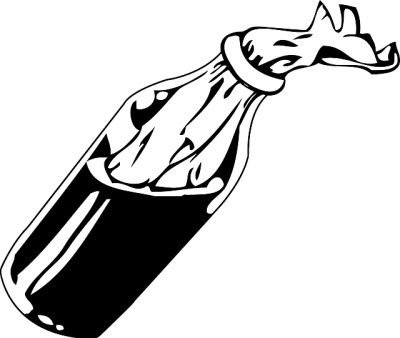


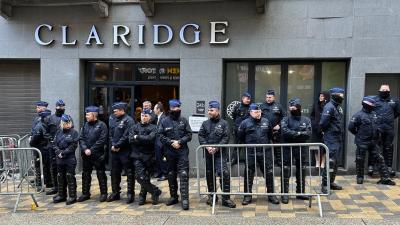

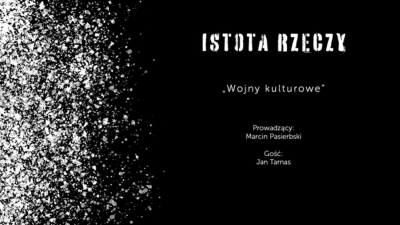

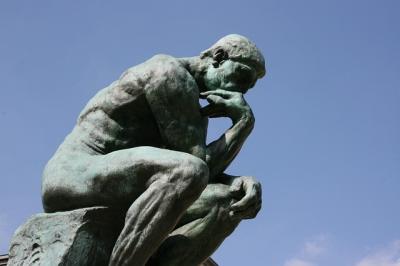

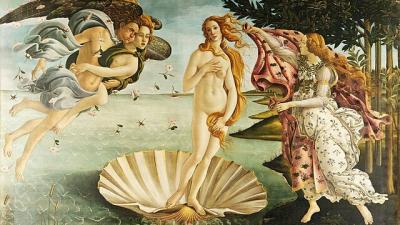

Comments (0)